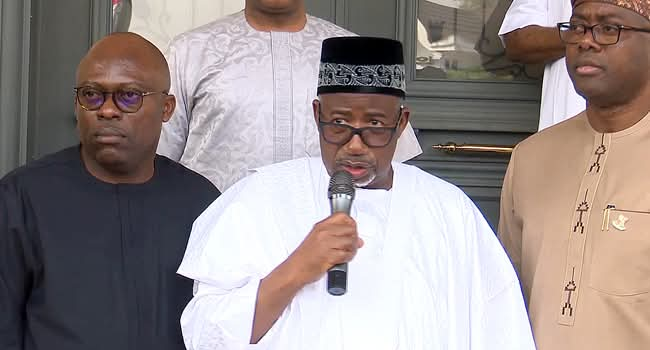The Presidency has called on Bauchi State Governor Bala Mohammed to withdraw his threats against President Tinubu regarding proposed tax reforms, emphasizing the importance of constructive dialogue.
The Presidency has requested that Bauchi State Governor Bala Mohammed retract his threat to President Bola Tinubu regarding the tax reform bills.
In a Monday statement titled “RE: We’ll show Tinubu our True Colour,” Sunday Dare, Tinubu’s Special Adviser on Media and Public Communication, shared on his X handle that Mohammed’s threat was described as “inflammatory.”
This occurred following a statement from the governor, who claimed that President Tinubu would be “calling for anarchy” if he proceeded with the tax reforms.
Governor Mohammed made this statement while speaking to the Christian community in Bauchi on Boxing Day.
He cautioned that if these policies persisted, the northern region would “reveal its true intentions” in retaliation.
Mohammed also highlighted that these reforms might result in economic challenges, pointing out that they primarily benefited only one state within the federation.
He called on the federal government to reassess and implement more inclusive policies.
The Presidency stated, “I encourage him to withdraw these confrontational comments and instead focus on engaging in productive discussions with the FG about any concerns regarding the Tax Reform Act.”
The statement clarified that Mohammed’s opinion does not represent the perspective of the entire northern region.
This regrettable statement does not reflect the collective views of Northern Nigeria. Similar to other regions, the North aims for cooperative governance and productive dialogue with the Federal Government to tackle our nation’s challenges.
Instead of making threats, he could focus his energy on implementing effective poverty alleviation programs and ensuring that the N144 billion received from the federal government is used transparently. The Tax Reform Act and increased federal allocations provide significant benefits to the states.
His remark, “We will show President Tinubu our true colors,” is especially troubling and does not embody the constructive dialogue needed between the state and federal government.
It’s worth mentioning that under the current administration, Bauchi State has received a total of N144 billion in federal allocations (State and LGA), marking a notable increase from previous disbursements.
“However, his state still faces significant developmental challenges and high poverty rates. As a governor, he is expected to demonstrate leadership and strive for national unity,” Dare stated.
The Presidency subsequently clarified that the N144 billion federal allocation to Bauchi State represents one of the largest increases in federal disbursements, offering substantial fiscal resources to the state.
It stated that this included a recent N2 billion special intervention fund allocated to each state to strengthen food security. Furthermore, the removal of fuel subsidy compensation payments has considerably increased state revenues. The argument also highlighted special considerations for derivation funds designed to safeguard the interests of northern states.
Dare suggests that simplifying the various taxation systems will reduce the strain on small businesses in Bauchi.
He noted that the reforms emphasize supporting Bauchi’s farming communities by enhancing revenue collection efficiency through digitalization, providing protection for informal sector workers—who are vital to the state’s economy—and implementing targeted measures for agricultural businesses.
The Presidency also highlighted that these reforms pave the way for development by establishing frameworks designed to attract investments through tax incentives and enhance capacity within state revenue services.
The organization argued that these initiatives demonstrate the federal government’s commitment to promoting development at the state level.
In October 2024, President Tinubu presented a series of tax reform bills to the National Assembly aimed at revamping Nigeria’s tax system.
The four bills—the Nigeria Tax Bill 2024, the Tax Administration Bill, the Nigeria Revenue Service Establishment Bill, and the Joint Revenue Board Establishment Bill—aim to consolidate current tax laws, streamline tax administration processes, and boost revenue generation.
Key provisions involve raising the Value Added Tax rate from 7.5% to 10% by 2025, with additional increases anticipated, as well as implementing a 5% excise duty on telecommunications services.
Dare emphasized that rather than resisting these initiatives, Governor Mohammed could fully optimize their advantages by instituting transparent fiscal management systems, creating state-specific tax incentives to draw in investors, and investing in agricultural value chains.
He contended that for Nigeria to achieve prosperity, it needs a unified approach instead of divisive language.
He encouraged public officials to move beyond regional biases and political showmanship, embracing a united vision for a stronger and more prosperous nation.
The obstacles we encounter—from poverty to security and from economic growth to social development—go beyond state borders and political lines. It is crucial for all political leaders to remember that their main duty is enhancing the lives of their citizens, a goal best accomplished through constructive dialogue, effective resource management, and a steadfast dedication to national unity.
The way ahead is through cooperation, not conflict; thoughtful engagement rather than threats; and unified action over divisive statements to achieve our common goals of development and progress.
This represents the genuine leadership Nigeria requires—one that focuses on building connections rather than divisions, and places the welfare of all above personal or regional agendas. In Hausa, this sentiment may ease the political tensions facing the Governor: “Gyara kayanka baya zama sauke mu raba.”
Peoplesmind


